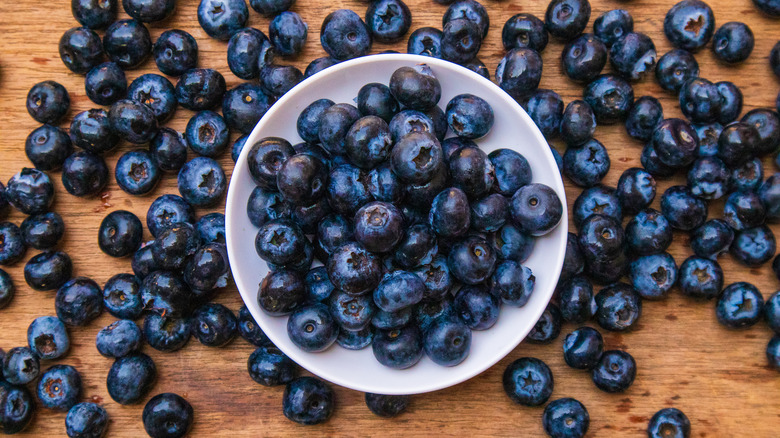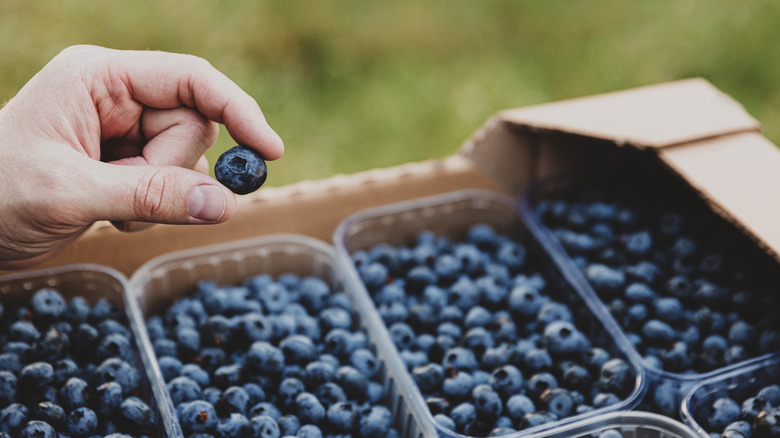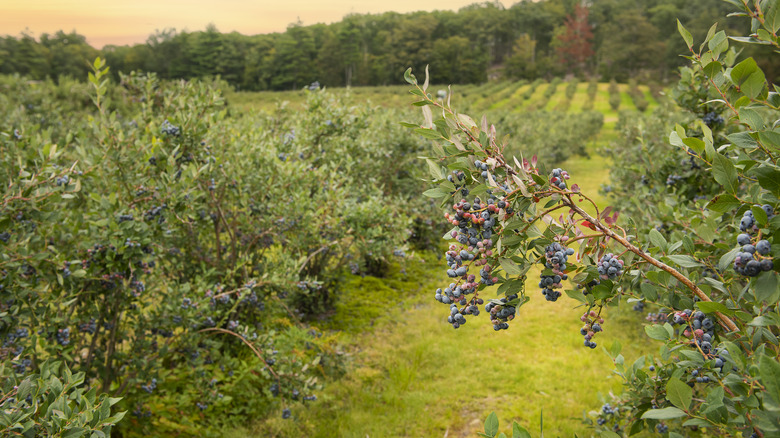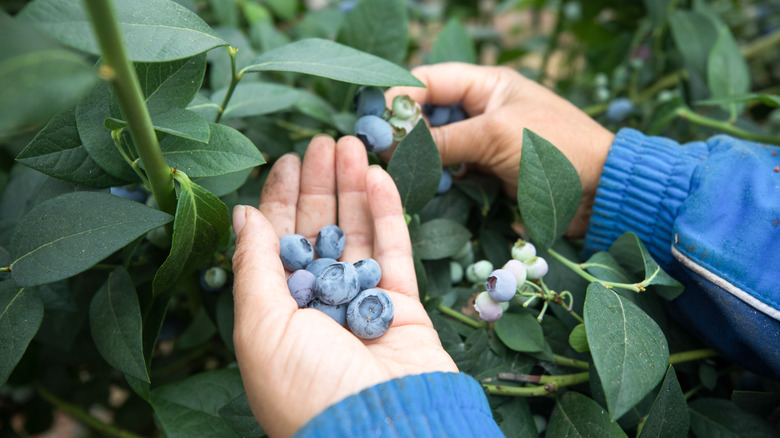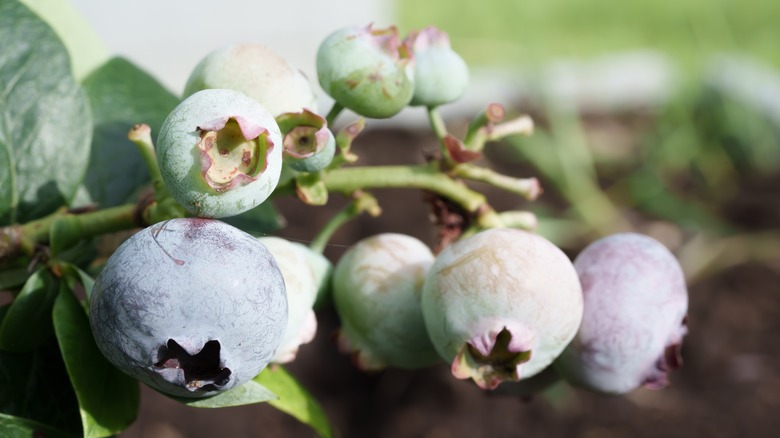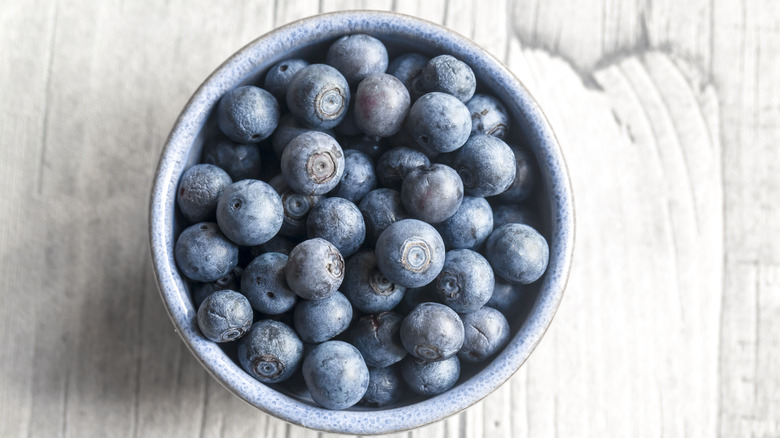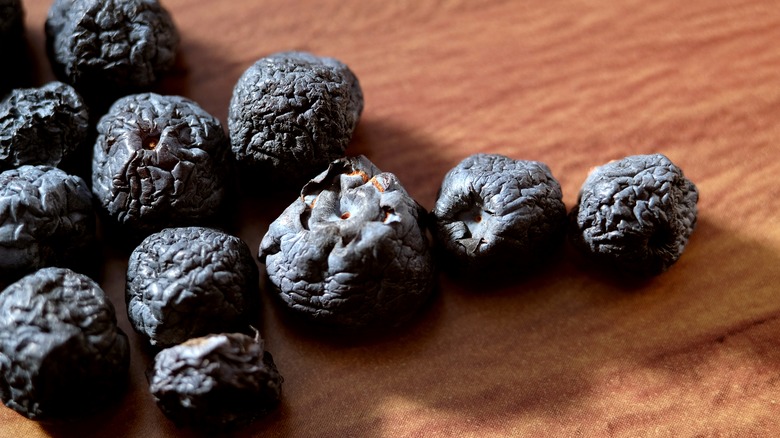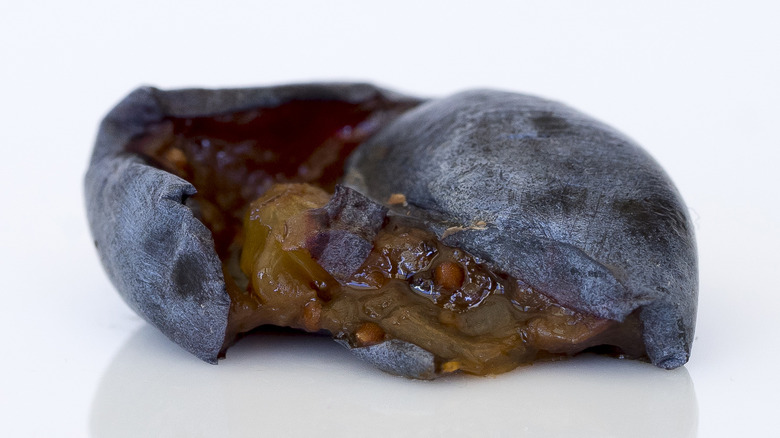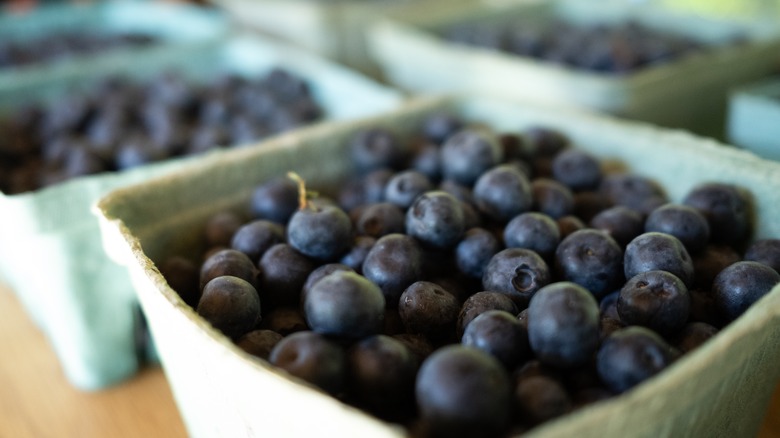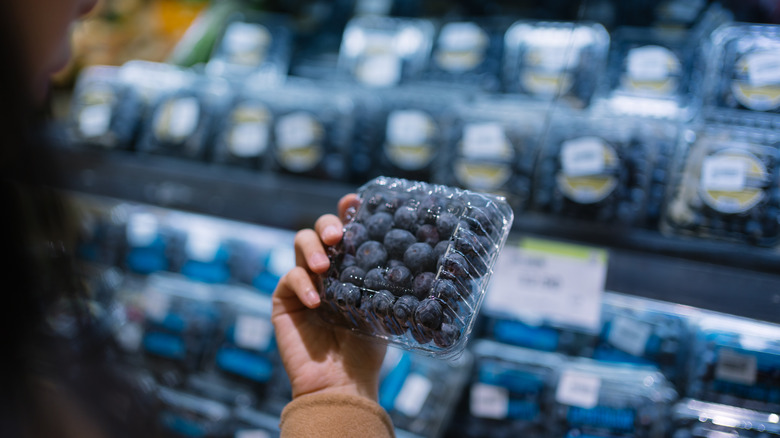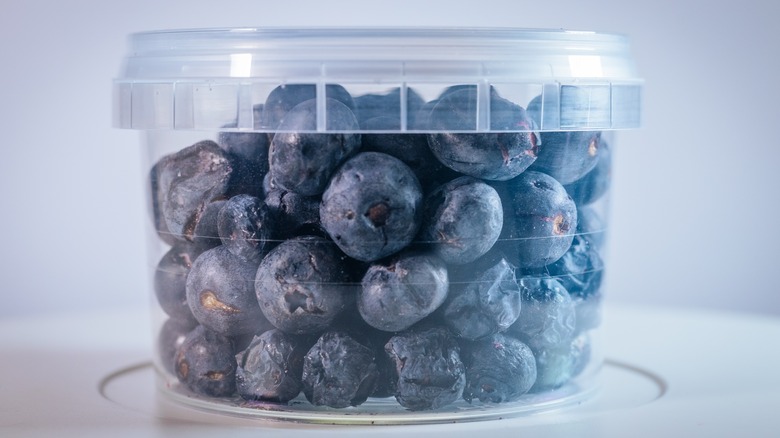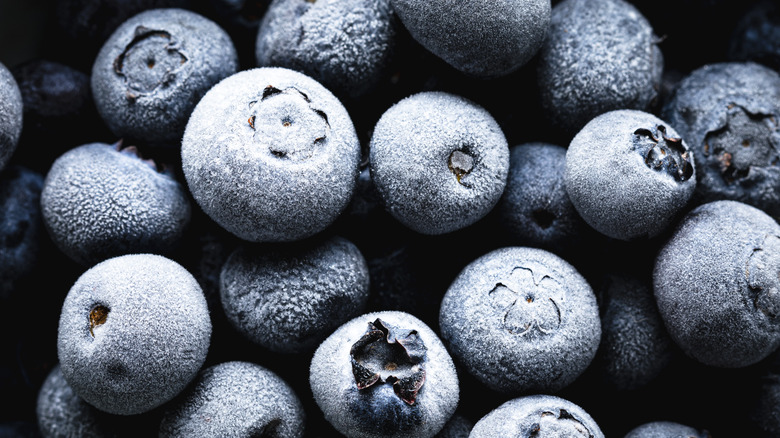11 Mistakes To Avoid When Buying Blueberries, According To An Expert
Blueberries are delightful little powerhouses of nutrition, packed full of antioxidants and phytochemicals. So much so that they are even credited with being a superfood. Lucky us, they taste deliciously sweet, as well. That is, of course, if you don't select the wrong ones, which will undoubtedly let you down with a sour taste or lack of flavor — you don't have to be from Washington, the state that grows the most blueberries, to know that.
If you've ever found yourself examining fresh blueberries and trying to determine which ones to buy, you are not alone. Should you opt for the biggest blueberries? Ones that are not quite ripe yet? Or, is there a sniff test to help point you in the right direction? As it turns out, all of these factors matter, some probably not how you'd expect, and selecting the right blueberries isn't as much of a guessing game as many of us think.
We all want to avoid common mistakes when buying blueberries, so I checked in with an expert, Edwin Dysinger, to shed some light on the matter. He is an expert gardener and a Co-Founder of Seedtime, a leading garden planning and management app. He had quite a lot to say about common blueberry mistakes and how to select the best berries every single time. Hopefully, with a little help from him, we can all start steering clear of common blueberry buying mistakes and hone in on the good ones from here on.
Bigger doesn't always mean better
One of the first areas where people go wrong when selecting blueberries for purchase is assuming the biggest ones pack the most or the sweetest flavor. It's easy to assume because it is the case with other fruits, but it's simply not so with blueberries. As expert gardener Edwin Dysinger told me, "With blueberries (and many other things in life) bigger is not necessarily better. Blueberry size is determined largely by the variety grown and is not an indicator of flavor or fruit quality." He went on to tell me that several varieties produce excellent-tasting, high-quality berries that are on the smaller side. The same goes for certain varieties that produce larger ones, as well.
Dang, okay. Dysinger's insight may seem counterintuitive to some of us, but it's actually spot on. All you have to do is look at Maine wild blueberries, which are relatively tiny and still exceptionally sweet and tasty, to know that this is true. So, the next time you select the perfect carton or clamshell of blueberries, don't rely solely on size to steer your purchasing decision. Once you get them home, you can always use a simple water hack to separate the sweetest berries from the bunch. Simply toss them in a bowl of water, and any that sink to the bottom will give you the best, sweetest flavor. Nice!
Not knowing when blueberries are in season
Everyone knows that buying produce when it's in season leads to the best quality and flavor, but if asked, most of us can't tell you when this window is for our favorite fruits and veggies — at least not without a little help. With this in mind, not knowing when blueberries are in season is a big mistake if you want the best of the best, which, of course, we all do. According to our expert, Edwin Dysinger, "In the U.S.A., peak blueberry season runs from May through September." This does not mean that you should limit yourself to only purchasing blueberries during these months, but it should help you manage your expectations.
As Dysinger told me, when you buy blueberries in the United States outside of their peak season, you should expect one of two things: Either they have been in storage for some time, or they were shipped in from another region of the world where they are currently in season, like Chile or Peru (two of the top producing countries that the U.S. imports blueberries from all of the time). Dysinger also noted, "Blueberries that have been stored (and shipped) for some time are more likely to have less flavor and quality than blueberries freshly picked in season." Well, when he puts it that way, it just makes sense, right? Keep this in mind when purchasing blueberries from October through April, and you shouldn't be in for any real surprises.
Opting not to pick blueberries yourself whenever it's an option
If you've never had the pleasure of picking blueberries yourself, either on a farm or in the wild, let me tell you: You are missing out. Not only is it a super fun, cute activity, but according to Edwin Dysinger, it's hands-down the best way to ensure you get the tastiest fruits, "For the freshest berries, best quality and flavor, pick them yourself." After all, when you take matters into your own hands, literally and figuratively, you are guaranteed to get berries at their very best. There won't be any travel time to factor in, unless you count your drive home, and you can keep any less-than-desirable-looking berries out of your container. Winning!
Dysinger also noted that there's no need to worry if you aren't familiar with any u-pick blueberry patches or where they might be located. Just check the Local Harvest website, and it will point you in the right direction. If you aren't lucky enough to live even remotely close to a u-pick blueberry patch, bummer, but it's not the end of the world, either. Just remember to avoid the other common blueberry picking mistakes Dysinger outlined for us and follow his helpful tips along the way. They may not result in the freshest blueberries humanly possible, but they'll still get you pretty darn close.
Thinking blueberries will ripen once you get them home
Lots of fruits continue to ripen after they have been picked. Avocados are a perfect example of this. However, according to gardening expert Edwin Dysinger, thinking blueberries will do the same is a common mistake many people make. Unlike avocados and more, blueberries stop ripening the moment they come off the bush, so you want them to be perfectly ripe when you purchase them. If not, you'll be stuck with what you get, and no length of time sitting around will fix the issue.
Dysinger also told me, "For most fruits, color is an indicator of ripeness, and this is true for blueberries. Most blueberry varieties are ripe when the color is dark blue to almost black." If you come across any blueberries that are shades of green, white, or pink, they were picked too soon and are not ripe. Unfortunately, as we now know, they won't ripen any further, either, so you'd be wise not to purchase them. Actually, opting for unripe blueberries is one of the common cooking mistakes you can make with the fruit, as well. So, don't think you can simply cook with them and hide the unripe taste. Do yourself a flavor, I mean favor, and simply leave them on the store shelf.
Selecting blueberries that lack a silvery-white coating, aka bloom
In addition to selecting blueberries that are dark blue to almost black in color, Edwin Dysinger told me we should look for "bloom" when determining ripeness. Not doing so is a big mistake, and fortunately it's one that is easy to avoid. Wait a second, though, what is this "bloom" he speaks of? Well, he told me it is the term used to describe "the dusty, silvery-white coating on blueberries." As it turns out, it has nothing to do with actual blooming flowers, and chances are good you've seen the bloom on blueberries many times before.
It can be easy to assume that the bloom on ripe blueberries is mold or something equally as unappealing, but that couldn't be further from the truth. According to Dysinger, "It's not mold — it's a natural, edible wax layer that serves as the berry's protective shield." Cool! When absent, it is a sign that the blueberries have likely been compromised somewhere along the production line or during shipping. While the bloom is, in fact, edible, he also noted that it can easily be washed off. However, since it serves as a natural layer of protection, you shouldn't wash it off until right before consumption. When the time comes to remove the bloom on blueberries, if you choose to do so, a simple solution of water and vinegar will get the job done in a matter of moments.
Buying blueberries with wrinkled or broken skins
This next mistake won't come as much of a shock to many of you, but sometimes the most obvious indicators of less-than-desirable fruit are the easiest to overlook, so it must be said. According to Edwin Dysinger, "Wrinkled or broken skins are a sign of over-ripe and/or damaged berries." It probably goes without saying, but he told me specifically that you don't want anything to do with these kinds of berries.
Even if you think you can somehow repurpose over-ripe or damaged berries into something like jam or baking, there's no avoiding the sour taste that comes along with them. You could try to mask it with an excessive amount of sugar, but it'll be there all the same. As for damaged berries, there's no guarantee bacteria and other undesirable contaminants did not worm their way into the fruit as well. Instead of worrying about this or trying to overcome a sour taste, just avoid blueberries with wrinkled or broken skins. If the selection at your local store or produce stand is lacking and you can't seem to find any that don't exhibit these traits, opting for another fruit could be your best bet. There's always frozen blueberries, too, but more on that later.
Selecting blueberries that are stuck together or mushy
Along the same lines as broken or wrinkled skins, Edwin Dysinger also recommends steering clear of blueberries that are mushy or stuck together, "Fresh, ripe berries should be firm, not mushy." This seems pretty common sense for most of us, but buying blueberries with these traits is a more common mistake than you might expect because it can be tricky to evaluate all of the berries inside of a container, at least while you are still in the grocery store.
Luckily, Dysinger offered a helpful trick to help us avoid buying mushy, stuck-together blueberries, "If you are purchasing berries in a plastic clamshell, when you shake it, they should rattle. If they 'thud' instead of rattle, and seem to stick together, they are most likely not fresh and may be over-ripe or spoiling." Cool, huh? It kind of makes me want to go to the store right now and listen to the different sounds blueberries make, but I guess we should save that for their prospective buyers. No fun, I know, but we probably don't want to contribute to their mushiness and speed up deterioration. Sigh.
Not choosing blueberries with a sweet, mild fragrance
Smelling cantaloupes or honeydew melons is a fantastic way to determine ripeness, whether under- or over-ripe. Lucky us, the same can be said for blueberries. Not conducting a quick sniff test on blueberries before purchasing is another common mistake Edwin Dysinger says we should all avoid.
So, what smell should we be on the lookout for when it comes to selecting the best blueberries? According to Dysinger, "Fresh, ripe berries have a sweet, mild fragrance. If they have any sour or fermented smell, they are overripe and spoiling." What this means is that it will be easier to detect spoilage than ripeness, but that's more than okay. After all, spoilage is the number one thing to avoid. Under-ripe berries aren't great, but they sure beat the crap out of spoiled ones, right? You may feel a bit silly in the grocery store sniffing containers of blueberries, but if it leads to the best selection, I couldn't care less, and you shouldn't either. Keep your nose peeled for the sweet, mild aroma Dysinger told us about, and our blueberries will be better because of it.
Overlooking juice or stains inside the container
When selecting blueberries to buy, there will be signs of undesirable product even outside the berries themselves. Enter the next common mistake: Overlooking blueberry juice or stains inside the container they come in. As expert gardener Edwin Dysinger told me, "Juice or stains on the container are a sign that the berries have been handled roughly and/or that they may be over-ripe and compromised." And those are two things we definitely want to avoid.
If you think about it, visible stains or juice are the next step in some of the mistakes we've discussed thus far. For example, broken skins (something to be avoided) will inevitably lead to stains or juice spreading throughout a container. Rough handling feeds into broken skins, as well. Whatever you do, make sure not to go overboard when shaking to ensure you aren't purchasing mushy blueberries — a tip previously shared by Dysinger. Otherwise, you'll only be damaging the blueberries. Or, at the very least, making things trickier for the next shopper who scrutinizes them before purchasing.
Buying blueberries in airtight containers
Many foods benefit from being stored in an airtight container, blueberries not so much. According to Edwin Dysinger, "Any sign of condensation or moisture inside the blueberry container is a sign of concern — it will hasten deterioration of the berries." That's why you almost never find them being sold inside an airtight one. Instead, they typically come in thick cardboard-like cartons or plastic clamshells with plenty of ventilation. However, if you ever come across fresh blueberries that are being sold in an airtight container, choosing to buy them would be a mistake.
"For best storage, containers need to be well ventilated," says Dysinger. Doing such prevents rapid deterioration and spoilage. Basically, you want to think of moisture like a fresh blueberry's nemesis, at least when it comes to storage. Obviously, you can wash them before eating; it's highly advised, but storing them with trapped-in moisture is a big no-no. It quickly leads to mushy berries. No, thanks. There are some varying opinions on how to store blueberries, but Dysinger is the pro, so I advise following his guidelines. Better safe than sorry, right?
Forgetting that frozen blueberries are a fantastic, nutritious option
The final blueberry mistake gardening expert Edwin Dysinger told me we all need to avoid is overlooking frozen products. In fact, he even said, frozen blueberries are often your best option when they aren't currently in season in the United States. He elaborated by telling me, "Studies have shown that frozen blueberries have nearly the same nutrient value as fresh blueberries, while blueberries stored in refrigeration for five days had much less."
So, if you are looking to get as many nutritional benefits as possible from these tasty little superfoods (why wouldn't you be?), frozen blueberries are not only a wonderful option, but, depending on the time of year, could be the best choice, health and flavor-wise. Who can argue with that? Some would even say that blueberries are the only frozen fruit that should be used in homemade pies because they don't get as watery as other frozen fruits. Translation: Frozen blueberries are actually better for some purposes. Score.
Additionally, Dysinger told me, "If you are in-season and u-picking, immediately freeze all the blueberries that you are not able to eat fresh!" This will help preserve their inherent nutritional value and ensure you get the most out of every single blueberry. Of course, it also guarantees none will spoil or go to waste before you get a chance to enjoy them in all of their perfectly ripe glory.

